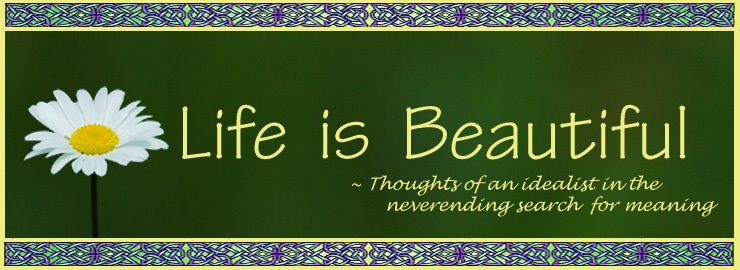
Sorry I haven't been around the blogosphere much lately. Between Jason's awesome contest, a new cat (a very sweet stray cat adopted us during the holidays), and germs taking up residence in our home (ugh!-- this is the first week since the holidays that both girls are actually at school, where they belong!), I haven't had much "me time" to devote to blogging. I had no idea what to blog about when I woke up this morning. But while reading Chris Eldin's blog, an idea was sparked.
Have you ever had the experience of discovering that you can connect the dots between seemingly unrelated interests and experiences in your life? I feel such glee when this happens. But then, I am predisposed to enjoying connections and meaning thanks to my thinking preferences (you know, the I, N, F, and J ways of thinking…)
:)
So I thought I'd share one of these connections with you.
Dot #1:
Some of you know that motherhood is a topic of great interest to me. I had no idea how much motherhood would change my life (cliché, I know…), but my postpartum experience made me consider shifting gears in my career. I had been a geriatric rehab specialist. Now I'm considering breaking new ground in Occupational Therapy by starting a practice devoted to the needs of new moms who are struggling with role transition.
In my research into the struggles of motherhood, I came upon a book by Dr. Harvey Karp-- The Happiest Baby on the Block (which, btw, should be a mandatory baby shower gift!) and found his "Fourth Trimester" theory. He calls the first 3 months of an infant's life the Fourth Trimester, because according to the positive (and significant)correlation between mammalian body size and length of gestation, human pregnancy should last 12 months, not 9. But since modern humans evolved larger craniums (relative to body size) than our hominid ancestors, moms who carried to full term died during childbirth. Those who delivered at 9 months, when the baby's head could still pass through the pelvis safely, survived. And, as a result, we are left to deal with newborns who would much prefer to still be in the womb for the first 3 months of their life.
Dot #2:
When I read Dr. Karp's theory, I just smiled. Because I had heard a similar theory 15 years before I became a mother. During a time when motherhood was the farthest thing from my mind.
In college I wrote a term paper about how the pelvic and cranial anatomy of Neanderthals may predict gestation length. At that time, a new theory in physical anthropology fascinated me-- that Neanderthals' pregnancies probably lasted 12 months.
That class, Human Evolution, was the beginning of what became an anthropology minor (my major was biology). And of course, that can be connected to:
Dot #3:
When I was 8, I told my parents that I wanted to be an archeologist when I grew up. This interest came from my fascination with human evolution, dinosaurs, and:
Dot#4:
I was always interested in time travel. I read every story I could find about time travel. Those Choose Your Own Adventure books were the best!
Believe it or not, there is an even earlier connection that can be made. An interest in time and connections across time can be argued to be a result of:
Dot #5:
My inborn thinking preferences: INFJ (see my posts on personality theory for the definition). My brain was wired to gather data through intuiting processes and make decisions based on feeling. These ways of thinking, paired with introverting and judging, make for a personality type (INFJ) that finds meaning in connections and often displays ESP-like foresight.
Which is why I am so delighted when my foresight fails to predict a connection and I discover it after the fact…
:)


